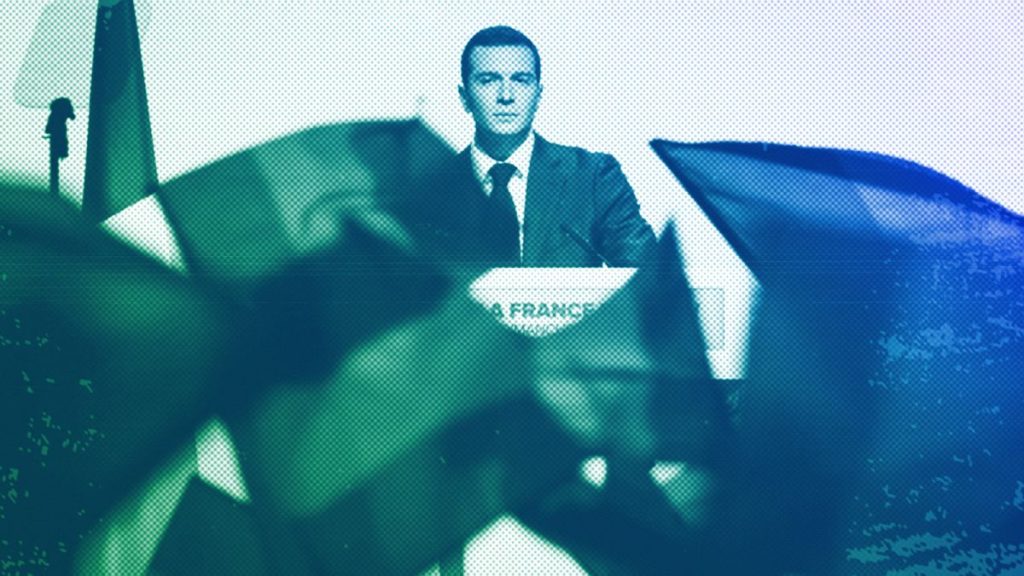Summarize this content to 2000 words in 6 paragraphs in Arabic
By Pierre-Alexandre Balland, Chief Data Scientist, Centre for European Policy Studies
The opinions expressed in this article are those of the author and do not represent in any way the editorial position of Euronews.
This is one heck of a chess move by President Macron. Whether it succeeds or not, it will make history. But it is a much more calculated move than it seems, Pierre-Alexandre Balland writes.
ADVERTISEMENTSunday’s European elections stunned Europe as far-right parties surged in France. The National Rally is set to claim about 31% of votes, more than doubling President Emmanuel Macron’s Renaissance party at 15%. Macron immediately announced, “I have decided to give you back the choice of your parliamentary future through voting. Therefore, I dissolve the National Assembly tonight”, calling for rapid legislative elections on 30 June and 7 July.This rare move, which last took place in 1997, is a bit like King Arthur’s testing the gods’ trust by reinserting Excalibur.Will a far-right government lead one of the EU’s largest members by the Paris Olympics? Macron’s decision to call new legislative elections has been described as bold, reckless, and desperate. In truth, it’s a calculated risk with potentially higher rewards than inaction. Most likely, the far right will not win the French legislative elections.What happens if Macron’s strategy succeeds?It would counter the prevailing narrative that the far right is taking over France. Today’s headlines suggest this trend and it’s crucial to address it early. By returning to the voters, Macron aims to show that the European election results don’t mirror the wider political sentiment in France. This move could also mobilise those worried about the far right’s rise, serving as a call to action. With Macron’s pro-European stance, this could significantly curb the far right’s momentum both in the EU and globally.The National Rally — known as the National Front until 2018 — already secured first place in the European Parliament elections in 2019 and before that in 2014. But historically, the far right struggles to mirror its EU success in French national elections.Let’s look at the popular vote. In the 2019 European elections, the National Rally received a total of 5,286,939 votes. However, three years later, during the French legislative elections, it only received 3,589,269 votes. There is a 32.1% cut when you move from the EU to the national level. Using the same rate, the 7,765,944 votes of 9 June would shrink to 5,272,250.In 2022, the winner (Ensemble) gathered 8,002,419 votes, and in 2017, LREM won with 7,826,245 votes. Macron is betting that the National Rally will not find an additional 2.5 million voters in less than a month. Much more complex (and accurate) modelling strategies exist, but the main point is that replicating this win at the French level is unlikely and would represent a seismic political shift.It’s not one round in the ring — it’s twoThe drop from EU to French election results comes from different voting systems. France’s two-round electoral system for legislative elections is a significant barrier to far-right parties. While these parties may perform well in the first round when traditional parties are divided, the second round sees a shift. Here, voters from both left and right often unite behind more moderate candidates to prevent a far-right victory, a strategy known as the “Republican Front”. Despite making gains, the far right struggles to build the broad coalition necessary to win in the final round.ADVERTISEMENTAnd in French parliamentary elections, results are decided locally across 577 constituencies, favouring parties with broad, evenly spread support. The National Rally may dominate specific regions but fail to achieve the widespread vote distribution necessary to win multiple seats. Larger parties not only have more uniform support but also more resources to get strong, locally recognized candidates across all constituencies, enhancing their chances of securing a majority. The National Rally will struggle to find competitive candidates across all constituencies quickly.And there are peculiar reasons why French voters might lean far-right in EU elections but opt for moderation nationally. Economic issues, where Macron’s party shows strength, dominate national elections and sway undecided voters. Additionally, the perceived low impact of the European Parliament on daily life makes EU elections a safe venue for protest votes with minimal consequences. This is true in France and in Europe more generally — but Bardella’s notable absence in Strasbourg amplifies this low-risk perception.However, the path to becoming prime minister and governing is much steeper. Macron appears to be counting on catching the National Rally off-guard and highlighting their program’s inconsistencies.ADVERTISEMENTWhat happens if the National Rally wins?One cannot downplay the growing influence of the far right in French politics and Europe in general. These parties have capitalized on a wave of discontent among voters who are dissatisfied with the current government’s policies on economic development, immigration, and security. So what if, against what I believe to be all odds, the National Rally wins and gets to govern? Then Bardella and Le Pen will be in the driver’s seat. It is much harder than being in the opposition. If it governs badly, it will suffer a huge setback during the 2027 elections. And if it governs effectively and resolves every economic, social, and environmental issue, then we’ll all live happily ever after. So even in this less likely scenario, Macron’s strategy might be a winning one.I don’t have a crystal ball, and this is one heck of a chess move by President Macron. Whether it succeeds or not, it will make history. But it is a much more calculated move than it seems.ADVERTISEMENTPierre-Alexandre Balland is Chief Data Scientist at the Centre for European Policy Studies, a Brussels-based think tank.At Euronews, we believe all views matter. Contact us at view@euronews.com to send pitches or submissions and be part of the conversation.


